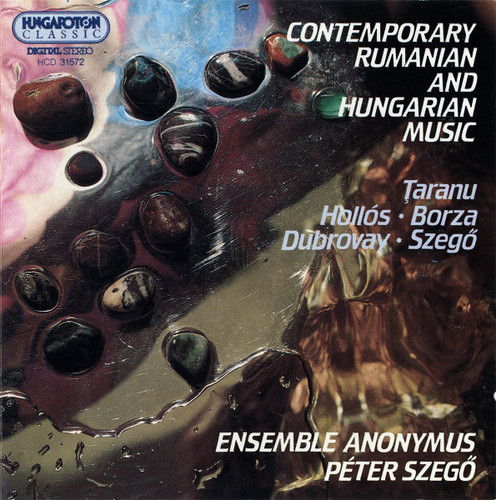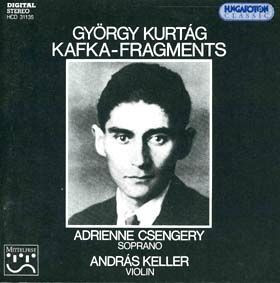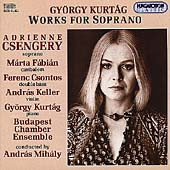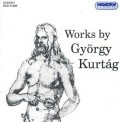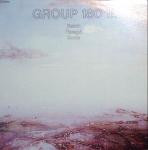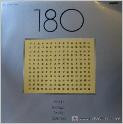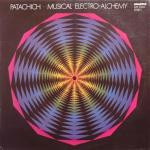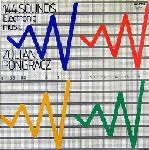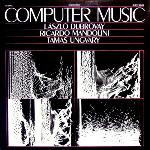★Hungaroton Classic
Kafka-Fragments
A wonderful CD, recorded under Kurtag's supervision: the hour-long Kafka Fragments, completed in 1986, is his biggest work to date: it's a characteristic cycle of 40 tiny movements, scored for soprano voice and violin, that adds up to something far greater than the sum of its parts.The text is a mosaic of quotations from Kafka's writings, diaries and letters. The cycle is divided into four parts, articulated by the two longest movements; they draw a huge range of expression from soprano Juliane …
Works for Soprano
Kurtág's attachment to speech is also to be sensed in the works from this first period of maturity, something which emerged more concretely in this CD maily cenetered around the Russian language, which he learned especially in order to read Dostoevsky, and which is almost "sacred" for him, in the way that Latin was for Stravinsky. In his Russian works, opp 16 to 19, Kurtág's response to Russian prosody transforms his musical dialect with a poignant lyricism; this is to be heard both in the works…
Works
An amazing introduction to Kurtag's complex work, this cd Gyorgy Kurtag is a modern master of the musical miniature, this 66-minute disc, containing six works, is split into nearly forty tracks, absolutely essential!
II.
Group 180 II is from 1985 and exhibits the same good taste in modern compositional works. There are two pieces by Steven Reich, “Piano Phase” and “Octet”. Compositions by András Soós and Bela Farago make up the rest of the album. It should be note that, with the exception of Rzewski and Reich, the composers are all members of Group 180. It is again a well played set and one that fans of modern music will treasure. Only one copy available.
180-AS-CSOPORT
'Group 180' ('180-as Csoport' in Hungarian) was a Hungarian ensemble dedicated to the performance of new music, active from 1978 until 1990. The group achieved recognition for their performances and recordings of contemporary music in the minimal style. Group 180's membership included several young Hungarian composers (among them László Melis and Tibor Szemz?), whose works formed an important part of the ensemble's repertoire. This brought the group prominence as one of the preeminent European n…
Musical Electro-Alchemy
Synthesist and electroacoustic composer born in 1933. Ivan Patachich was the musical director of Budapest film studios. He died in 1993. These recordings made in the Electronic Music Studio of the Hungarian Radio and in the Institute of Sonology, State University Utrecht. Very rare. Only one copy available.
144 Sounds: Electronic Music
Zoltán Pongrácz (5 February 1912, Diószeg - 3 April 2007) was a Hungarian composer. Pongrácz studied composition from 1930 to 1935 with Zoltán Kodály at the Budapest Academy of Music. He became professor of composition at the Debrecen Conservatory in 1947 and continued in that position until 1958. For a time he ceased compositional activity, until attending the Darmstadt summer courses in 1964, 1965, and 1972, and the third Cologne Courses for New Music in 1965–66 with Karlheinz Stockhausen, Hen…
Computer Music
Sonata for computer, Andromeda & L'aube des flammes composed 1984 and recorded at Electronmusikstudion (EMS) in Stockholm, Sweden. Harmonics II composed 1983 ; Parta con moto composed 1984 recorded at Elektronisches Studio in der Technische Universität (Berlin, Germany). Only one copy available.
Hungarian Electroacoustic Music
The spread of electro-acoustic music in Hungary was hindered for a long time by the lack of a studio of adequate technical standard. At first Zoltán Pongrácz has his own studio, then a few years later, in 1972, a modestly equipped workshop was established with the guidance of Iván Patachich. After two years' experimental work, the Hungarian Radio electro-acoustic music studio came into being in 1975 as part of the Hungarian Film Producing Company. During the 1970s the circle of composers began t…
